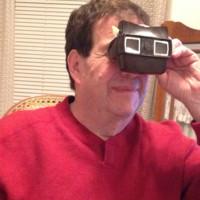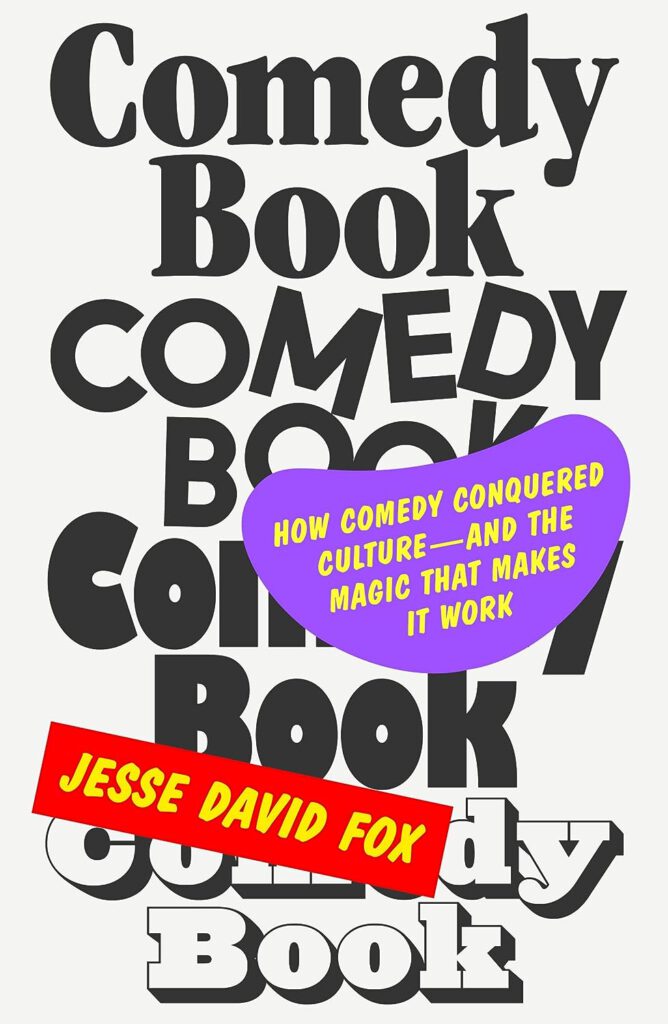In his new book, Comedy Book: How Comedy Conquered Culture—and the Magic That Makes It Work, Jesse David Fox recalls moderating an interview with Jerry Seinfeld and asking the comedian about his joke-writing process. Seinfeld responded, “This is my favorite thing to talk about, but I really think [the audience] is going to be so bored to hear it.”
Comedy Book is especially for comedy nerds, as it were, who are jazzed by such conversations. Fox writes about comedy for Vulture and treats it like the art form it is. People tend not to take comedy seriously. Woody Allen himself once compared comedy to being seated at the children’s table.
In book publishing, as in comedy, timing is everything. These are seemingly boom times for comedy. Fox writes, “There are more comedians of a greater variety performing for larger audiences across more platforms than ever.” So why does it seem that comedy is in greater peril than it’s ever been, where the telling of the wrong joke might get you not just canceled but slapped?
What are we talking about when we talk about comedy? What role does the audience play in the performance process? Just because we’re laughing, does that make something funny? Where is the line; is there anything comedians should not joke about? How important is it that comedy expresses a comedian’s truth? Is truthiness enough?
Fox delves into these and other facets of comedy, risking at all times the E.B. White maxim about the perils of dissecting comedy. “Humor can be dissected as a frog can,” he co-wrote with his wife Katharine, “but the thing dies in the process, and the innards are discouraging to any but the purely scientific mind.”
The frogs survive Fox’s lively and insightful analyses.
We spoke with Fox about taking comedy seriously (and lest you think Fox is some kind of comedy snob, there is a chapter devoted to the glories of Adam Sandler).
(This conversation was edited for space and clarity)
You open the book with a “Fleabag” reference: “This is a love story.” What was your first love in comedy?
“In Living Color.” It appealed to a young mind. The characters and performances were big. Jim Carrey making funny faces. Damon Wayans as Homey the Clown, I just thought it was funny for a birthday party clown to be mean. I didn’t understand anything deeper than that. And the show was something my dad liked. If your parents find something to be funny, it’s fun to be in a space where they’re laughing. “The Simpsons” followed “In Living Color” on the Fox schedule, and that was the first thing I actively thought that this is the thing that I like.
A recurring theme of this book is that comedy demands respect as an art form. I’ve noticed that actors known for comedy only get the critics’ huzzahs when they do a dramatic role. Like Jennifer Aniston in “The Good Girl.” Some critics called her performance a “revelation.” What did they think she was doing all those years before?
That seems like condescension to the [comedic] work they did before that often is wildly popular and extremely resonant with people. It reflects an inability to engage with people when they’re being sillier or an unwillingness to understand there is something behind the jokes.
You’ve been writing about comedy for more than a decade. You write in your book about your one-time-only experience doing standup. What did you learn about comedy from that?
Part of my job is to interview comedians. What I’m looking for in telling their story is who they are, how they work, and how they process themselves through their work. My goal is to be a conduit and translate the world of comedy to the reader. I was presented with a moment that I had read about in countless memoirs and heard about in countless podcasts about the time a standup got their first laugh and who they were afterward as a result. I remember my first laugh, but I did not have that [life-changing] feeling I was told other comedians felt. Being exposed to that, I had a deeper understanding of what it must be like that compels people to keep on doing it.
It’s easy to be like they’re all sad clowns, but having talked to and met a lot of comedians, it is often not that simple. I’ve met multiple comedians who had undiagnosed ADHD, and they felt a calm when they were on stage. They’re not being compelled by a hard childhood; they’ve just found a place where they feel comfortable.
I think it was Jack Benny who said that if a comedian makes an audience laugh, they’re funny. You reflect on this in the book. What is it like for you when you’re in an audience, and you’re not connecting with a comedian, but all around you, people are in hysterics?
If the comedy doesn’t connect with me for whatever reason, I don’t find it actively sinister or bad. I’m able to join in with the audience if the size and energy are correct. Mostly I’m happy to be around people laughing. I think, Okay, cool, this is great, the audience is doing a good job supporting whatever this is. You can appreciate it as you would any art form, like when you walk around a museum. You see different things and you go, I like this a lot, I’ll spend time with it, or, I don’t like this that much, but I’ll read what the deal is and contextualize it.
You quote Marc Maron, who said that laughter is the only thing standing between us and fascism. I don’t know; I saw one so-called right-leaning comedian who told these absolutely horrible jokes about Hillary Clinton, and the audience rocked with laughter. It was almost frightening.
It’s complicated. The problem is that as much as the right can say that all comedy on the left is clapter and pandering, that’s not exactly true. If you’re going to see a comedian just because you agree with their political opinions, then they are not operating as comedians. They are operating as birthday party clowns who repeat the phrases people know from watching Fox News. Donald Trump is the best version of that.
Another recurring theme of the book is that comedy should be taken seriously as an art form. Should there be an Oscar for comedy?
It’s a conundrum. If you have a Best Comedy Oscar, more comedies will be recognized. But you are recognizing it as a lesser thing, a sub-category. That would only work if you did that for other genres like Best Horror or Best Action. It’s too condescending to me. I don’t want it to be seen as a second-class art form.
It’s ironic that in a time of unprecedented access, there seems to be limited interest or knowledge about comedy’s forebears. I’ve noticed that about film as well. Do you think it’s important that comedy nerds know their history?
It’s really interesting. Comedy ages poorly. It’s hard to get people to appreciate things historically. Play Lenny Bruce to a 20-year-old, and to them, it doesn’t sound like comedy; it sounds like a guy talking in a jazzy way. I listen to ’60s music all the time. I look at paintings from hundreds of years ago. But comedy, its beauty is sort of its timeliness. The downside of that is it does make it very complicated to appreciate the history. But it does help in terms of contextualizing how certain things evolve. When you understand there is a history of the form, you have a better sense of who is evolving it and who is not, and it helps you appreciate them more. It’s hugely valuable.
This book has the feel of a magnum opus. Was it cathartic to write?
I’ll say yes. I’ve been thinking about and covering comedy for 10-plus years. If you read this, you will get a sense of how I view all these different facets of comedy and how they are related to each other. But Comedy Book is by no means me claiming that I’ve now said everything about comedy. The hope is that now we can start talking about it.
So, the book is a conversation starter.
That’s the goal. I have no interest in telling people what to think. I’m hoping to help them evolve how they feel about comedy.












